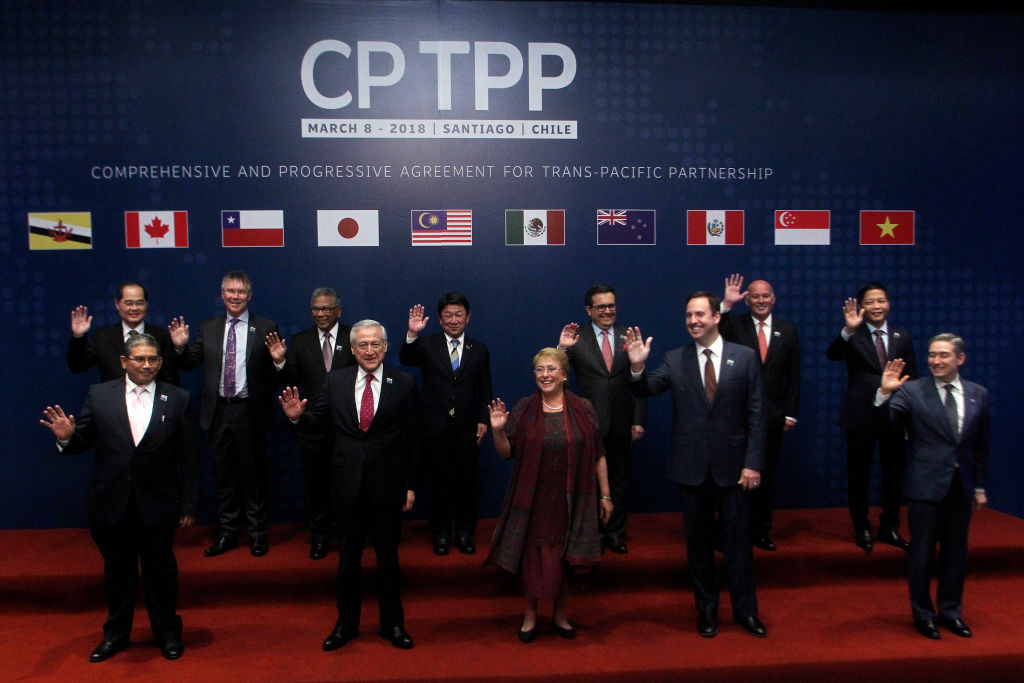After years of negotiations, the Trans-Pacific Partnership is finally a go — without America

A free daily email with the biggest news stories of the day – and the best features from TheWeek.com
You are now subscribed
Your newsletter sign-up was successful
Just before President Trump is set to sign orders on protective tariffs for steel and aluminum imports, 11 U.S. allies signaled their commitment to free trade by signing the Trans Pacific-Partnership trade deal. The U.S. was not among the signatories, having backed out of negotiations last January.
The formulation of the partnership, which is made up of countries that together comprise more than 13 percent of the global economy, was initially spearheaded by the U.S. as a means to counter China's surging economic power. But Trump, following through on one of his most consistent campaign promises, killed the deal soon after entering the White House in order to "protect American workers." Most analysts predicted that the U.S.'s exit from the agreement would kill the deal, but the remaining countries — Australia, Brunei, Canada, Chile, Japan, Malaysia, Mexico, New Zealand, Peru, Singapore and Vietnam — rallied to save it.
The deal, which is now formally known as The Comprehensive and Progressive Agreement for Trans-Pacific Partnership (CPTPP), doesn't pack quite the same punch without the support of the U.S., but it will still be one of the world's three largest trade agreements. The New York Times reported that an analysis conducted by the Peterson Institute for International Economics estimates that the CPTPP will lead to $147 billion in additional global income — and possibly more, if other nations such as Indonesia, South Korea, the Philippines, Taiwan, and Thailand eventually join.
The Week
Escape your echo chamber. Get the facts behind the news, plus analysis from multiple perspectives.

Sign up for The Week's Free Newsletters
From our morning news briefing to a weekly Good News Newsletter, get the best of The Week delivered directly to your inbox.
From our morning news briefing to a weekly Good News Newsletter, get the best of The Week delivered directly to your inbox.
The U.S. has not completely written off the idea of re-entering into the agreement in the future, but the Trump administration's recent protectionist rhetoric will seemingly make that more challenging. Read more about the CPTPP at The New York Times.
A free daily email with the biggest news stories of the day – and the best features from TheWeek.com
-
 Political cartoons for February 16
Political cartoons for February 16Cartoons Monday’s political cartoons include President's Day, a valentine from the Epstein files, and more
-
 Regent Hong Kong: a tranquil haven with a prime waterfront spot
Regent Hong Kong: a tranquil haven with a prime waterfront spotThe Week Recommends The trendy hotel recently underwent an extensive two-year revamp
-
 The problem with diagnosing profound autism
The problem with diagnosing profound autismThe Explainer Experts are reconsidering the idea of autism as a spectrum, which could impact diagnoses and policy making for the condition
-
 TikTok secures deal to remain in US
TikTok secures deal to remain in USSpeed Read ByteDance will form a US version of the popular video-sharing platform
-
 Unemployment rate ticks up amid fall job losses
Unemployment rate ticks up amid fall job lossesSpeed Read Data released by the Commerce Department indicates ‘one of the weakest American labor markets in years’
-
 US mints final penny after 232-year run
US mints final penny after 232-year runSpeed Read Production of the one-cent coin has ended
-
 Warner Bros. explores sale amid Paramount bids
Warner Bros. explores sale amid Paramount bidsSpeed Read The media giant, home to HBO and DC Studios, has received interest from multiple buying parties
-
 Gold tops $4K per ounce, signaling financial unease
Gold tops $4K per ounce, signaling financial uneaseSpeed Read Investors are worried about President Donald Trump’s trade war
-
 Electronic Arts to go private in record $55B deal
Electronic Arts to go private in record $55B dealspeed read The video game giant is behind ‘The Sims’ and ‘Madden NFL’
-
 New York court tosses Trump's $500M fraud fine
New York court tosses Trump's $500M fraud fineSpeed Read A divided appeals court threw out a hefty penalty against President Trump for fraudulently inflating his wealth
-
 Trump said to seek government stake in Intel
Trump said to seek government stake in IntelSpeed Read The president and Intel CEO Lip-Bu Tan reportedly discussed the proposal at a recent meeting